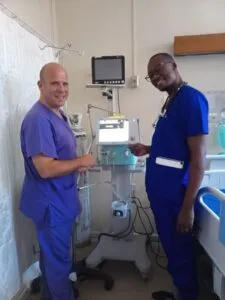The UK nurses behind a scheme to tackle malnutrition in critical care patients in Zambia have launched a bid to widen it across the African country, in the face of deep cuts to international aid budgets.
Nurse lecturers Chris Carter and Professor Joy Notter, co-directors of Birmingham City University (BCU)’s Centre for International Health Partnerships, started the Zambia clinical nutrition project in 2021.
“We believe in long-term partnerships, and particularly in our international work”
Joy Notter
It followed research funded by government arms’-length body UK Research and Innovation showing the dire impact of weight loss among critical care patients.
The nursing project, based in Lusaka, forms part of a longstanding partnership between BCU and Zambia’s Ministry of Health, which dates back over a decade.
It focuses on improving patient nutrition, key for tackling conditions associated with emergency department admissions, such as pressure ulcers and poor skin integrity, as well as for post-operative recovery.
The BCU nurses worked with a UK dietitian to develop a new feed for critical care patients in Zambia, as well as training for Zambian nursing staff on the proper use of nasogastric tubes for delivering food in critical care.
Training was delivered through a mixture of site visits and remote lectures from UK nursing staff, while the feed was developed using affordable and cost-effective ingredients such as milk and peanut butter.
“The clinical nutrition project came out from an identified need, because we recognised that patients were losing weight but there was very little resourcing or focus on nutrition,” said Mr Carter, explaining the importance of the work the partnership was delivering.
“When you talk about nutrition, in Zambia, people understand malnutrition or undernutrition, but a lot of the responses around feeding the nation and preventing malnutrition are from a public health perspective.
“But actually, the clinical nutrition part is where there’s a gap,” he noted.
Work was also done to improve nutritional assessments and ensure they were completed, to track the nutrition of a patient throughout their stay in hospital.
The project, Mr Carter and Professor Notter said, was well received by both patients and policymakers in Zambia, with the country’s health minister even trying it during a recent nursing conference.
At hospitals involved in the project, the majority (60%) of patients now do not lose weight during critical care admissions, according to BCU.
Pressure ulcers were also reduced, with far fewer patients experiencing them than before the first pilot of the project in 2021.

Chris Carter (left)
Mr Carter said the project has “taken off”, and that local clinicians and health leaders in Zambia have continued to help expand it.
He explained further that the work has since extended to monitoring, and improving, the nutrition of patients who have been discharged from intensive care as part of a follow-up service.
“We’re now looking at rehabilitation following critical illness, because there’s a high mortality in critical care units in low-income countries, but nobody really knows what happens to them afterwards,” Mr Carter continued.
“We’re now doing some research around actually following our patients and developing patient resources for when they go onto the water into the community.”
Other hospitals across the country, Professor Notter said, were requesting to join the scheme, including a leading Zambian paediatric care centre.
BCU has now launched a fundraising campaign in order to help keep the project sustainable and meet demand; they are aiming to raise £15,000 to buy supplies, train more staff and conduct further research.
They explained that the money will sit alongside philanthropic and grant donations, and go towards its expansion and continuation into the future.
Mr Carter has been involved with BCU’s work in Zambia since 2014 and Professor Notter has worked on development schemes across the world.
However, they warned that the sustainability of projects like theirs was under threat due to ongoing international aid cuts.
Professor Notter said the announcement earlier this year of heavy cuts to USAID – a US government-funded international development scheme – had an immediate impact in Zambia.
“It came as a tremendous shock to Zambia,” she said. “It was overnight… there were a lot of small projects that were being funded.
“There is now a challenge of how [they are] going to carry on,” she added.

Other countries have also, unfortunately, followed suit. This includes the UK government which has, in recent years, announced cuts to its own international aid pots.
The clinical nutrition project has been unaffected by this. But Mr Carter and Professor Notter said the challenge to make their work continue in the long-term remained.
Mr Notter said: “At BCU, we believe in long-term partnerships, and particularly in our international work… we believe in building that long-term relationship to achieve true change and true partnership.
“Whilst our funding streams are different… we try to we have a long-term vision, and then so that if the funding stops there is always something that they can implement and it’s sustainable within that.
“Both the UK and the USAID cuts are a real risk.”
He said the future was “definitely uncertain”, further highlighting why the project was moving towards a mixed model of funding, including public appeals for donations.
Professor Notter added: “Everybody’s now competing for a much smaller pot, and nursing tends not to be seen as something that’s high profile. It’s not easy for us.”

